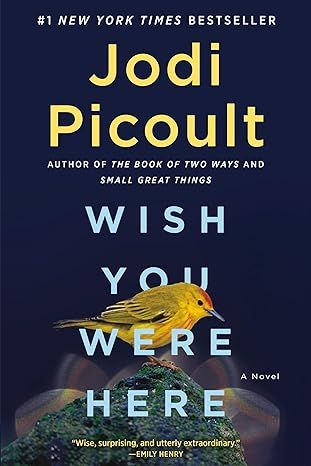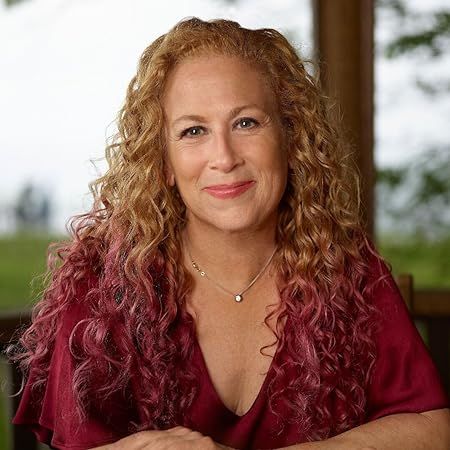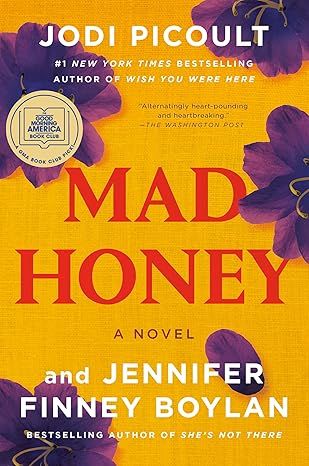Wish You Were Here: A Novel
4.3
-
48,783 ratings
#1 NEW YORK TIMES BESTSELLER • From the author of Small Great Things and The Book of Two Ways comes “a powerfully evocative story of resilience and the triumph of the human spirit” (Taylor Jenkins Reid, author of The Seven Husbands of Evelyn Hugo and Daisy Jones & The Six)
Rights sold to Netflix for adaptation as a feature film • Named one of the best books of the year by She Reads
Diana O’Toole is perfectly on track. She will be married by thirty, done having kids by thirty-five, and move out to the New York City suburbs, all while climbing the professional ladder in the cutthroat art auction world. She’s an associate specialist at Sotheby’s now, but her boss has hinted at a promotion if she can close a deal with a high-profile client. She’s not engaged just yet, but she knows her boyfriend, Finn, a surgical resident, is about to propose on their romantic getaway to the Galápagos—days before her thirtieth birthday. Right on time.
But then a virus that felt worlds away has appeared in the city, and on the eve of their departure, Finn breaks the news: It’s all hands on deck at the hospital. He has to stay behind. You should still go, he assures her, since it would be a shame for all of their nonrefundable trip to go to waste. And so, reluctantly, she goes.
Almost immediately, Diana’s dream vacation goes awry. Her luggage is lost, the Wi-Fi is nearly nonexistent, and the hotel they’d booked is shut down due to the pandemic. In fact, the whole island is now under quarantine, and she is stranded until the borders reopen. Completely isolated, she must venture beyond her comfort zone. Slowly, she carves out a connection with a local family when a teenager with a secret opens up to Diana, despite her father’s suspicion of outsiders.
In the Galápagos Islands, where Darwin’s theory of evolution by natural selection was formed, Diana finds herself examining her relationships, her choices, and herself—and wondering if when she goes home, she too will have evolved into someone completely different.
Read more
Kindle
$12.99
Available instantly
Audiobook
$0.00
with membership trial
Hardcover
$18.03
Paperback
$11.17
Ships from
Amazon.com
Payment
Secure transaction
ISBN-10
1984818430
ISBN-13
978-1984818430
Print length
400 pages
Language
English
Publisher
Ballantine Books
Publication date
June 13, 2022
Dimensions
5.5 x 0.82 x 8.3 inches
Item weight
11 ounces
Popular highlights in this book
That was how I learned that the world changes between heartbeats; that life is never an absolute, but always a wager.
Highlighted by 3,261 Kindle readers
You can’t plan your life, Finn, I say quietly. Because then you have a plan. Not a life.
Highlighted by 3,190 Kindle readers
The point is, if someone abandons you, it may be less about you and more about them.
Highlighted by 3,089 Kindle readers
Product details
ASIN :
B0925DXNV1
File size :
3983 KB
Text-to-speech :
Enabled
Screen reader :
Supported
Enhanced typesetting :
Enabled
X-Ray :
Enabled
Word wise :
Enabled
Editorial reviews
“Stealthily surprising and very moving . . . absolutely a must-read.”—Booklist (starred review)
“A satisfying and thought-provoking narrative.”—Minneapolis Star Tribune
“Jodi Picoult once again proves she is the master of wading through the darkness to find the light.”—Taylor Jenkins Reid, New York Times bestselling author of Malibu Rising
“Wish You Were Here is a transporting and transcendent novel about seeking out glimmers of light in the darkness, and following them wherever they lead. Jodi Picoult is that rare, one-in-a-million writer whose books both squeeze your heart and expand your mind. Her latest is wise, surprising, and utterly extraordinary.”—Emily Henry, #1 New York Times bestselling author of People We Meet on Vacation and Beach Read
“In Wish You Were Here, Jodi Picoult does something brilliant, cracking open something extraordinary. I am just overwhelmed by this book. I actually finished it at three in the morning and started reading it again.”—Caroline Leavitt, New York Times bestselling author of With or Without You
Sample
One
March 13, 2020
When I was six years old, I painted a corner of the sky. My father was working as a conservator, one of a handful restoring the zodiac ceiling on the main hall of Grand Central Terminal—an aqua sky strung with shimmering constellations. It was late, way past my bedtime, but my father took me to work because my mother—as usual—was not home.
He helped me carefully climb the scaffolding, where I watched him working on a cleaned patch of the turquoise paint. I looked at the stars representing the smear of the Milky Way, the golden wings of Pegasus, Orion’s raised club, the twisted fish of Pisces. The original mural had been painted in 1913, my father told me. Roof leaks damaged the plaster, and in 1944, it had been replicated on panels that were attached to the arched ceiling. The original plan had been to remove the boards for restoration, but they contained asbestos, and so the conservators left them in place, and went to work with cotton swabs and cleaning solution, erasing decades of pollutants.
They uncovered history. Signatures and inside jokes and notes left behind by the original artists were revealed, tucked in among the constellations. There were dates commemorating weddings, and the end of World War II. There were names of soldiers. The birth of twins was recorded near Gemini.
An error had been made by the original artists, so that the painted zodiac was reversed from the way it would appear in the night sky. Instead of correcting it, though, my father was diligently reinforcing the error. That night, he was working on a small square of space, gilding stars. He had already painted over the tiny yellow dots with adhesive. He covered these with a piece of gold leaf, light as breath. Then he turned to me. “Diana,” he said, holding out his hand, and I climbed up in front of him, caged by the safety of his body. He handed me a brush to sweep over the foil, fixing it in place. He showed me how to gently rub at it with my thumb, so that the galaxy he’d created was all that remained.
When all the work was finished, the conservators kept a small dark spot in the northwest corner of Grand Central Terminal, where the pale blue ceiling meets the marble wall. This nine-by-five-inch section was left that way intentionally. My father told me that conservators do that, in case historians need to study the original composition. The only way you can tell how far you’ve come is to know where you started.
Every time I’m in Grand Central Terminal, I think about my father. Of how we left that night, hand in hand, our palms glittering like we had stolen the stars.
It is Friday the thirteenth, so I should know better. Getting from Sotheby’s, on the Upper East Side, to the Ansonia, on the Upper West Side, means taking the Q train to Times Square and then the 1 uptown, so I have to travel in the wrong direction before I start going in the right one.
I hate going backward.
Normally I would walk across Central Park, but I am wearing a new pair of shoes that are rubbing a blister on my heel, shoes I never would have worn if I’d known that I was going to be summoned by Kitomi Ito. So instead, I find myself on public transit. But something’s off, and it takes me a moment to figure out what.
It’s quiet. Usually, I have to fight my way through tourists who are listening to someone singing for coins, or a violin quartet. Today, though, the atrium is empty.
Last night Broadway theaters had shut down performances for a month, after an usher tested positive for Covid, out of an abundance of caution. That’s what Finn said, anyway—New York–Presbyterian, where he is a resident, has not seen the influx of coronavirus cases that are appearing in Washington State and Italy and France. There were only nineteen cases in the city, Finn told me last night as we watched the news, when I wondered out loud if we should start panicking yet. “Wash your hands and don’t touch your face,” he told me. “It’s going to be fine.”
The uptown subway is nearly empty, too. I get off at Seventy-second and emerge aboveground, blinking like a mole, walking at a brisk New Yorker clip. The Ansonia, in all its glory, rises up like an angry djinn, defiantly jutting its Beaux Arts chin at the sky. For a moment, I just stand on the sidewalk, looking up at its mansard roof and its lazy sprawl from Seventy-third to Seventy-fourth Street. There’s a North Face and an American Apparel at ground level, but it wasn’t always this bougie. Kitomi told me that when she and Sam Pride moved in in the seventies, the building was overrun with psychics and mediums, and housed a swingers’ club with an orgy room and an open bar and buffet. Sam and I, she said, would stop in at least once a week.
I was not alive when Sam’s band, the Nightjars, was formed by Sam and his co-songwriter, William Punt, with two school chums from Slough, England. Nor was I when their first album spent thirty weeks on the Billboard charts, or when their little British quartet went on The Ed Sullivan Show and ignited a stampede of screaming American girls. Not when Sam married Kitomi Ito ten years later or when the band broke up, months after their final album was released featuring cover art of Kitomi and Sam naked, mirroring the figures in a painting that hung behind their bed. And I wasn’t alive when Sam was murdered three years later, on the steps of this very building, stabbed in the throat by a mentally ill man who recognized him from that iconic album cover.
But like everyone else on the planet, I know the whole story.
The doorman at the Ansonia smiles politely at me; the concierge looks up as I approach. “I’m here to see Kitomi Ito,” I say coolly, pushing my license across the desk to her.
“She’s expecting you,” the concierge answers. “Floor—”
“Eighteen. I know.”
Lots of celebrities have lived at the Ansonia—from Babe Ruth to Theodore Dreiser to Toscanini to Natalie Portman—but arguably, Kitomi and Sam Pride are the most famous. If my husband had been murdered on the front steps of my apartment building, I might not have stayed for another thirty years, but that’s just me. And anyway, Kitomi is finally moving now, which is why the world’s most infamous rock widow has my number in her cellphone.
What is my life, I think, as I lean against the back wall of the elevator.
When I was young, and people asked what I wanted to do when I grew up, I had a whole plan. I wanted to be securely on a path to my career, to get married by thirty, to finish having kids by thirty-five. I wanted to speak fluent French and have traveled cross-country on Route 66. My father had laughed at my checklist. You, he told me, are definitely your mother’s daughter.
I did not take that as a compliment.
Also, for the record, I’m perfectly on track. I am an associate specialist at Sotheby’s—Sotheby’s!—and Eva, my boss, has hinted in all ways possible that after the auction of Kitomi’s painting I will likely be promoted. I am not engaged, but when I ran out of clean socks last weekend and went to scrounge for a pair of Finn’s, I found a ring hidden in the back of his underwear drawer. We leave tomorrow on vacation and Finn’s going to pop the question there. I’m so sure of it that I got a manicure today instead of eating lunch.
And I’m twenty-nine.
The door to the elevator opens directly into Kitomi’s foyer, all black and white marble squares like a giant chessboard. She comes into the entryway, dressed in jeans and combat boots and a pink silk bathrobe, with a thatch of white hair and the purple heart-shaped spectacles for which she is known. She has always reminded me of a wren, light and hollow-boned. I think of how Kitomi’s black hair went white overnight with grief after Sam was murdered. I think of the photographs of her on the sidewalk, gasping for air.
“Diana!” she says, as if we are old friends.
There is a brief awkwardness as I instinctively put my hand out to take hers and then remember that is not a thing we are doing anymore and instead just give a weird little wave. “Hi, Kitomi,” I say.
“I’m so glad you could come today.”
“It’s not a problem. There are a lot of sellers who want to make sure the paperwork is handed over personally.”
Over her shoulder, at the end of a long hallway, I can see it—the Toulouse-Lautrec painting that is the entire reason I know Kitomi Ito. She sees my eyes dart toward it and her mouth tugs into a smile.
“I can’t help it,” I say. “I never get tired of seeing it.”
A strange flicker crosses Kitomi’s face. “Then let’s get you a better view,” she replies, and she leads me deeper into her home.
Read more
About the authors
Jodi Picoult
Jodi Picoult is the #1 New York Times bestselling author of twenty-eight novels, including Wish You Were Here, The Book of Two Ways, A Spark of Light, Small Great Things, Leaving Time, and My Sister's Keeper, and, with daughter Samantha van Leer, two young adult novels, Between the Lines and Off the Page. Picoult lives in New Hampshire.
Her next novel, Mad Honey, co-written with Jennifer Finney Boylan, is available on October 11th.
Follow Jodi Picoult on Intagram, Twitter, and Facebook: @jodipicoult
Read more
Reviews
Customer reviews
4.3 out of 5
48,783 global ratings
J. C. Sandoval
5
Living, existing and life's plans
Reviewed in the United States on May 18, 2024
Verified Purchase
I powered through and read this very engaging novel and could barely put it down until its completion. The tale is more than just living through the throes of the worst facets of the pandemic, it also touches on life's plans and life's curveballs. From personal experience having worked in healthcare during the pandemic, the atrocities and mental anguish that Finn was experiencing was palpable. To this day, in 2024, I still tell others that the horrors spoken from health care workers were true, and somehow people, although moving forward, have short term memory of life with Covid. Thank you, Jodi Picoult, for memorializing it in such a poignant fashion and without the political strife that accompanied Covid's journey. Covid is the main undertone of the novel, but there is also an alternate reality going on with the consciousness of the main character, Diana, while she (spoil alert!) lay in limbo between life and death in an ICU in NY. As Diana recovers, she reimagines and redefines her life's plan. Although I have not traveled to the Galapagos Islands, the descriptions of a small secluded island without the modern conveniences were vividly described. But life's modern conveniences were incidental when you consider droves of people were dying. The contrast between Finn's narratives and the islands solitude was a wonderful juxtaposition and word crafting. Covid did indeed change the lives of many, if not all of us, in many ways. In some ways clinically or physiologically, for others psychologically, and for all of us who do not have short term memory of the atrocities and tragedies, it changed the way we live and behave as humans and treat ourselves and others. Life's plans changed drastically for Diana and Finn as a fallout from her near death experience. Much appreciated perspective from the eyes of Diana and Finn, as well as Rodney and others.
Read more
5 people found this helpful
carolyn
5
Another home run for Picoult
Reviewed in the United States on July 15, 2024
Verified Purchase
I am never disappointed when I read a Jody Picoult book. Her clever dialogue, sensitive feelings, and research add up to a to notch read. I always learn something new from her research.
Florence McReynolds
5
Wish You Were Here
Reviewed in the United States on March 16, 2024
Verified Purchase
I was affected personally by the pandemic as was most of the world. But I have a brother, who was diagnosed in March of 2020 with Covid. He was a very young 60 year old in great shape and with no comorbidities. However, he wound up in the hospital for five weeks. Three of those weeks were spent in ICU and eight of the days he was intubated. He was one of the VERY fortunate few who survived being intubated. At the time he was discharged from the hospital I believe he was the only one who had made it.
As a retired Registered Nurse, the description of the horror that the medical personnel and patients were experiencing was so very accurate. Especially since I had a brother who was fighting for his life. Like several of the patients who survived intubation, he experienced several things while intubated that felt very real to him. Some were positive and others were terrifying.
This book was an excellent representation of what was happening in hospitals all over the world. This was an historical novel that read like very recent history. I loved the characters who were very well developed. I also liked the twists and turns which are common in Jodi’s novels. I highly recommend this book.
Read more
13 people found this helpful
Top Jodi Picoult titles
View allSimilar Books
Best sellers
View all
The Tuscan Child
4.2
-
100,022
$8.39

The Thursday Murder Club: A Novel (A Thursday Murder Club Mystery)
4.3
-
155,575
$6.33

Sapiens: A Brief History of Humankind
4.6
-
140,302
$13.49

The Butterfly Garden (The Collector, 1)
4.3
-
88,556
$9.59

Things We Hide from the Light (Knockemout Series, 2)
4.4
-
94,890
$11.66

The Last Thing He Told Me: A Novel
4.3
-
154,085
$2.99

The Perfect Marriage: A Completely Gripping Psychological Suspense
4.3
-
143,196
$9.47

The Coworker
4.1
-
80,003
$13.48

First Lie Wins: A Novel (Random House Large Print)
4.3
-
54,062
$14.99

Mile High (Windy City Series Book 1)
4.4
-
59,745
$16.19

Layla
4.2
-
107,613
$8.99

The Locked Door
4.4
-
94,673
$8.53









